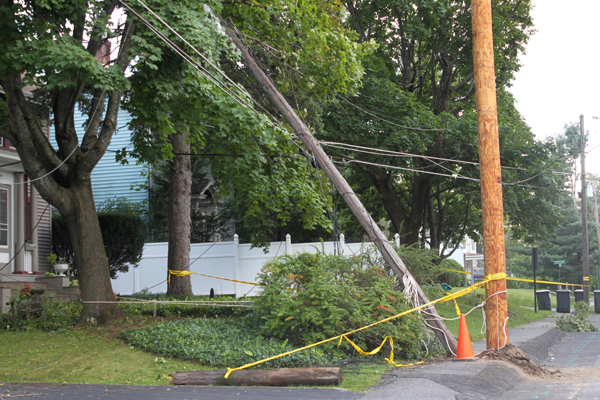

The SUNY New Paltz campus was left in the dark and disconnected last week courtesy of Hurricane Irene.
The campus Internet and cable services were cutt off from power from Sunday, Aug. 28 through Tuesday, Aug. 30, as a result of the storm’s severity. The torrential downpour became an issue when the rains gushed down the loading dock and the entire parking lot outside of Haggerty Administration Building (HAB) filled up, according to Assistant Vice President of Technology, Jonathan Lewit.
“It actually came up across Route 32 and streamed in down here. The drains couldn’t keep up,” he said. “It started going up the side of the wall on the HAB side, seeping in under the door and it hit almost 3 feet on the door. Then it was coming in underneath.”
Water flooded into the print shop, the telephone system room, the records office, the ID office, the parking office and the bookstore. However, the electrical issues arose when water entered the computer center, as well as the Student Union (SU) basement where all of the heavy-duty electrical distribution equipment is kept.
Those in the computer center worked to slow down the water by piling up boxes of paper outside the door to mimic sandbags, Lewit said. While they may have been successful as the computer center received only 3 inches of water and the server room only got half an inch, Lewit said the floor of the center proved to be problematic.
“The computer room floor has raised tiles and we run all the power cords and stuff like that underneath and so the water got only about half an inch above the raised floor,” Lewit said. “But all the network cables and all the power cables under the floor basically were all under water.”
Lewit said luckily, workers had been in the building earlier and were able to respond quickly upon hearing about the mess. They began shutting everything down and turned off the main power to the room before it completely flooded under the floor.
The SU basement was not as fortunate as the computer center was, engulfed in about 8 feet of water. Because of such great water accumulation, Lewit said they were forced to kill the power to the building for safety purposes. There is an emergency generator that usually runs the telephone system, computer system and the internet connection in the event of power failure, however this was not in option.
“Because the main electrical system was underwater, they stopped that from kicking in and basically had to cut the service period,” Lewit said.
Workers had several pumps going to remove all the water. Lewit said they then had to dry the basement out and “meticulously clean off all the high voltage connections before they even thought about turning power back on.”
On Tuesday, Lewit said they began turning power back on and did not experience any huge sparks, indicating that it was cleaned up and functional. Fixing these issues did come at a price, both figuratively and literally. Local and outside electricians as well as facilities staff worked 20 hour days to get the buildings cleaned up and the campus back online, according to Lewit. The cost for the cleaning crew and the electric work is estimate to be a million dollar operation, according to Lewit.
Although most students on campus were not rendered powerless, they did feel the stress of no Internet access. Second-year anthropology major Jamie Pagirsky’s feelings on the matter changed over time.
“The period of time longer than 24 hours without internet was certainly… interesting. Initially, it was a difficult adjustment,” Pagirsky said. “But after some time, I realized just how refreshing it was to spend time with friends on a more personal level. Even if it meant the suite collapsing in front of TV for hours on end. It was a fun change to witness.”
Some students, however, did not view the lack of technology in such a positive light. Third-year elementary education major Brianna Buckler had many friends without cell phone service, along with no internet which put them at a disadvantage for receiving information.
“The power outage on campus caused many problems especially in terms of notifications about the campus. Those without cell phone capabilities had to rely on their friends for the text message updates about what was open and closed on campus, as well as how to get around safely,” Buckler said. “The reliance on technology was too heavy, as those without it were uninformed.”
Even though he said Irene was extremely detrimental to campus, Lewit said that things pulled together surprisingly quickly. All involved, including staff, the maintenance crew, telecommmunications workers, electricians and computer center employees, truly made the effort to work together and get it done. Not only does Lewit believe they achieved a “phenomenal thing,” but also that the damage could have been much more destructive.
“The water stopped before it hit the cabinets of the computer center with all the servers, it was an inch, maybe 2 inches away still,” Lewit said. “It’s hard to say you were lucky after something like this, but we were lucky.”
